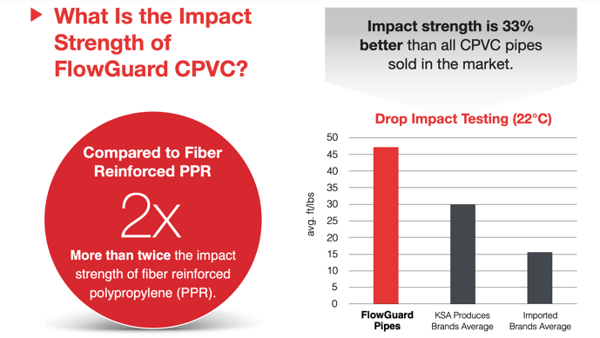Impact Strengths: The Strength of FlowGuard® CPVC Pipe
One of the most important attributes one should consider when choosing pipe material is how well it can withstand impacts, or a suddenly applied load. The demanding applications for pipe placed in plumbing or HVAC systems require specific performance characteristics. Before the pipe even goes into service, it is stored, handled and installed. Damage to the pipe during transport or from falling items on the job site can be costly to the project and cause potential delays.
This is why the pipe must possess what is known as impact strength or impact resistance. Piping, like most construction-related material, is tested and rated for its ability to deform when a force is applied. Those materials determined less flexible with the test are more likely to incur damage under a certain weight or force.
For FlowGuard® CPVC pipe, the flexibility determined in the test is considerably high, giving it a distinct advantage over other commonly used piping materials such as generic CPVC and fiber reinforced PPR. This means FlowGuard CPVC plumbing pipes are flexible enough to absorb the shock of typical non-severe impacts, bouncing back into shape without structural damage to the material or to its connecting system.

This is not necessarily the case with generic CPVC and fiber reinforced PPR. Depending on the type and intensity of the impact, generic CPVC and fiber reinforced PPR can be more likely to dent or crease, which will affect fluid flow in service. Additionally, small cracks can form, weakening wall strength, limiting pressure capabilities and increasing corrosion concerns. Part of the shock of the impact can also be transferred to the adjoining seams and joints.
FlowGuard CPVC is made of proprietary formulations for pipe performance properties: in an impact test conducted according to ASTM D2444, FlowGuard CPVC resisted 18 foot-pounds of impact energy without failing. On average, the impact strength of FlowGuard CPVC is 33 percent better than other CPVC pipes sold in the market, and has more than twice the impact strength of fiber reinforced polypropylene (PPR).
This is just another reason why you can trust FlowGuard CPVC pipe for hot and cold water service, even before it’s in service. As you start to consider your next project, contact us with any questions.
.png)
-1.png)